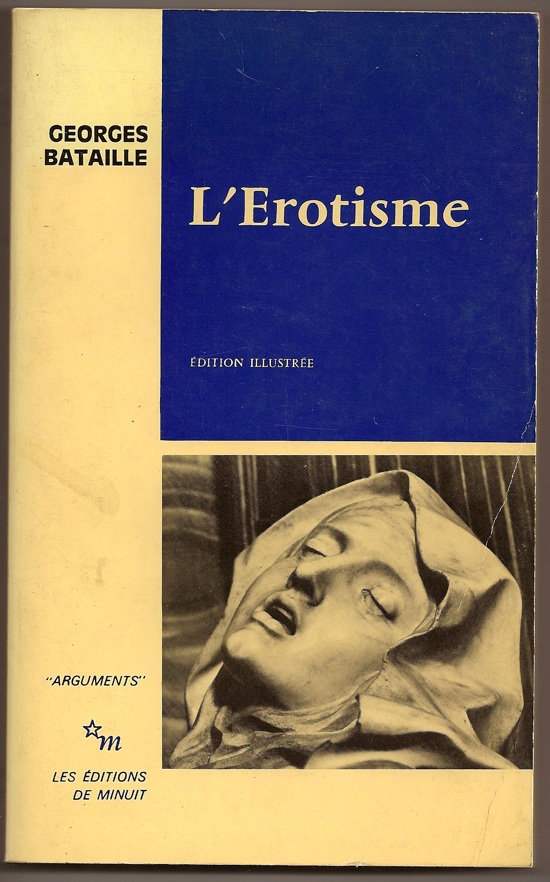Georges Bataille: Erotism: Death and Sensuality (1957–) [FR, ES, EN, IT, PT]
Filed under book | Tags: · death, ecstasy, eroticism, language, psychology, religion, sex, sexuality

Taboo and sacrifice, transgression and language, death and sensuality—Georges Bataille pursues these themes with an original, often startling perspective. He challenges any single discourse on the erotic. The scope of his inquiry ranges from Emily Bronte to Sade, from St. Therese to Claude Levi-Strauss and Dr. Kinsey; and the subjects he covers include prostitution, mythical ecstasy, cruelty, and organized war. Investigating desire prior to and extending beyond the realm of sexuality, he argues that eroticism is “a psychological quest not alien to death.”
First published in French as L’Érotisme, Éditions de Minuit, 1957.
This edition published within Oeuvres complètes. Tome 10 (pp 1-270), together with Le procès de Gilles de Rais and Les larmes d’Éros.
Publisher Gallimard, 1987
734 pages
English edition
Translated by Mary Dalwood
The first edition in English was published as Death and Sensuality: a Study of Eroticism and the Taboo, Walker and Company, NY, 1962.
Publisher City Lights Books, San Francisco, 1986
ISBN 0872861902, 9780872861909
280 pages
Review (Mark Price, Philosophy Now)
L’Érotisme (French, 1957/1987). Alt link.
El erotismo (Spanish, transcript, trans. María Luisa Bastos, 1960)
Erotism: Death & Sensuality (English, trans. Mary Dalwood, 1962/1986)
L’erotismo (Italian, transcript, trans. Adriana dell’Orto, 1962)
O erotismo (Portuguese, trans. Antonio Carlos Viana, 1987)
Roberto Esposito: Communitas: The Origin and Destiny of Community (1998/2003/2010) [Spanish/English]
Filed under book | Tags: · community, ecstasy, experience, fear, guilt, law, nihilism, philosophy

No theme has been more central to international philosophical debates than that of community: from American communitarianism to Habermas’s ethic of communication to the French deconstruction of community in the work of Derrida and Nancy. Nevertheless, in none of these cases has the concept been examined from the perspective of community’s original etymological meaning: cum munus. In Communitas: The Origin and Destiny of Community, Roberto Esposito does just that through an original counter-history of political philosophy that takes up not only readings of community by Hobbes, Rousseau, Kant, Heidegger and Bataille, but also by Hölderlin, Nietzsche, Canetti, Arendt, and Sartre. The result of his extraordinary conceptual and lexical analysis is a radical overturning of contemporary interpretations of community. Community isn’t a property, nor is it a territory to be separated and defended against those who do not belong to it. Rather, it is a void, a debt, a gift to the other that also reminds us of our constitutive alterity with respect to ourselves.
Originally published in Italian as Communitas: Origine e destino della comunita, 1998, Giulio Einaudi Editore
Spanish edition: Communitas: Origen y destino de la comunidad
Translated by Carlo Rodolfo Molinaro Marotto
Publisher Amorrortu editores, Buenos Aires, Argentina, 2003
Mutaciones series
ISBN 9505187149
English edition
Translated by Timothy C. Campbell
Publisher Stanford University Press, 2010
Cultural Memory in the Present Series
ISBN 0804746478, 9780804746472
175 pages
publisher [Spanish]
publisher [English]
google books [Spanish]
google books [English]

